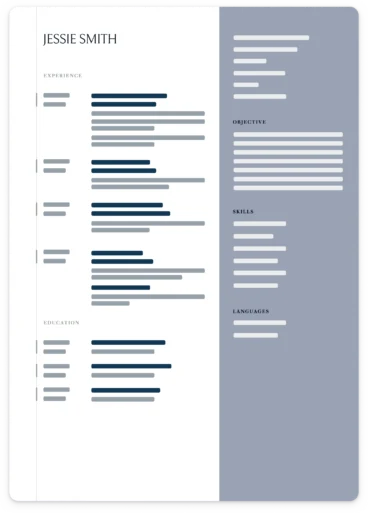Chemistry Resume Samples
Entry-level candidate seeking Chemist job
Dedicated Chemistry graduate seeking to improve health outcomes in the United States by reducing exposure to harmful chemicals.
- Conducted undergraduate research at Community University on the effects of landfill runoff on local waterways
- Presented research findings at a national environmental conference
- Analyzed data and compiled reports during a 1-year internship at ABC Chemical
Experienced candidate seeking a Chemist placement
Synthesized acrylic, enamel, and latex-based paint formulations for a multi-million-dollar company with experience managing projects through all stages of development, from concept to retail launch.
- Conducted production trials, interfaced with trial customers, and made recommendations for product improvement
- Researched and evaluated competitor’s product lines
- Trained new technicians and support staff
Chemist Resume Vocabulary & Writing Tips
Today, many employers utilize a computerized system to pre-screen the resumes that they receive. The software looks for the use of keywords important to the job and ranks the resumes based on the presence of these keywords.
Where can you find the right keywords to use in your resume? Examine the company’s website, as well as job descriptions and job listings. Below, we’ve assembled a list of keywords common to several successful chemist resumes.
When your resume is complete, be sure to check it for errors in spelling, grammar, and punctuation.
Words to Use
- Products
- Personal protection equipment (PPE)
- Certificate of analysis
- Matter
- Properties
- Molecular
- Variables
- Data
- Observations
- Critical thinking
- Reports
- Novel
- Organic
- Inorganic
- Physical
- Computer science
Action Verbs
- Manipulate
- Create
- Process
- Test
- Pack
- Ship
- Assist
- Develop
- Study
- Investigate
- Understand
- Interact
- Research
- Solve
- Experiment
- Formulate
Chemist Resume Tips and Ideas
To become a chemist, you must understand substances on a molecular and atomic level, how they are put together, and how they will interact with other substances.
However, a typical day for a chemist can vary. Some perform research with the goal of obtaining knowledge and contributing to the scientific community. Others perform standard tests on substances — for example, testing river water samples for the presence of chemicals.
Industrial chemistsare charged with developing new products or improving existing ones, while other chemists are involved with the creation of medication or cosmetics.
Your work environments also differ as a chemist but will generally involve a laboratory and/or a manufacturing facility. Chemists may work for educational institutions, private companies, or even the government.
The most common qualifications for this role are:
- Chemical composition knowledge (the structure and properties of substances, as well as their reactions)
- Technical and computer skills
- Qualitative and quantitative analyses abilities
- Teamwork, attention to detail, and collaboration
Educational requirements for chemists include a bachelor’s degree in chemistry or a related field. However, a master’s degree or Ph.D. is needed for many research jobs.
Employment of chemists is projected to grow six percent from 2019 to 2029, as fast as the average for other occupations.
Format
A chronological resume format is recommended
Design
When designing your chemist resume, consider:
- Professional appearance
- Sections and headings
- White space
Photo
No
Sections
Required:
- Contact information
- Objective statement
- Skills
- Work history
- Education
Optional:
- Qualifications summary
- Conferences and seminars
- Publications
- Language proficiency
Resume Length
1-2 pages
Format
A chronological resume format is recommended for all chemists.
The chronological resume typically begins with your contact information and objective summary, followed by a reverse-chronological listing of your work experience and education.
Note: professionals in the chemistry industry rely heavily on their education. Though atypical, consider listing your education above your work experience for maximum effect.
Recent graduates should also list research or work experience and professional affiliations in reverse chronological order, in addition to their education, skills, and clinical exposure.
Combination and functional resume formats are not recommended for chemists.
Design
It is important to present a resume that is professional, clean, and detailed when working in a highly specialized field like chemistry. Avoid infographics and images that may confuse applicant tracking system. You can customize an online resume template or design your resume based on one of our professional samples.
To make your resume ATS-friendly, incorporate resume subheadings throughout your document. Titles and headings can be slightly larger than the surrounding text. Highlight headings using bold or italic fonts.
Remember, shorter resumes usually perform better in online applications. Limit your resume to one to two pages.
Hiring managers only spend an average of 7 seconds looking at a resume. Therefore, a cluttered resume with overwhelming blocks of text will put off potential practices. Keep your font legible and use sizes 11 to 13 for enhanced readability.
Photo
In the United States, you are not required to submit a photo with your resume. In some cases, an unsolicited photo can result in your resume being discarded due to anti-discrimination laws.
If applying to a position in another country, research common resume practices in that country. In some nations, you will be expected to submit a photo with your resume.
Sections of a Chemist Resume
A number of sections are vital to your chemist resume. These include:
- Contact information
- Objective statement
- Skills
- Work history
- Education
The aforementioned sections will allow your potential employer to contact you and give him or her a sense of where your career is now, your journey to this point, and where you would like to be in the future.
You can also include additional sections to increase your value in the eyes of your employer, such as:
- Qualifications summary
- Conferences and seminars
- Publications
- Language proficiency
The qualifications summary takes your skills list to the next level by describing the skills in detail and quantifying the results where possible. A qualifications summary is especially valuable when applying for chemist jobs that demand a highly specialized skill set.
Have you attended any industry conferences or seminars? Have you taken part in any continuing education or training? Have you published any articles or books? Do you speak a language other than English? If so, be sure to include these value-added elements on your resume.
Resume Length
Generally, your chemist resume should be limited to one page in length. On rare occasions, your experience, certifications, or portfolio may necessitate a second page.
Design your resume to be printed on 8.5 by 11-inch paper. If submitting a physical copy of your resume, use a high quality resume or business grade paper.
Chemist Resume Section Headings
When writing your chemist resume, there are a few key sections that are vital to your application materials. They are:
- Contact information
- Summative statement
- Education
- Work experience
- Skills
Have you attended any industry conferences or seminars? Have you taken part in any continuing education or training? Have you published any articles or books? Do you speak a language other than English? If so, be sure to include these value-added elements on your resume in separate sections, such as:
- Honors and awards
- Publications
- Conferences and seminars
- Languages
- References
A qualifications summary is especially valuable when applying for chemist jobs that demand a highly specialized skill set. Here, you should describe your skills in detail and quantify the results where possible.
Education
Chemists are generally required to have obtained at least a Bachelor’s Degree in Chemistry, Chemical Engineering, or a related field. Often, Master’s Degrees or Ph.D.’s are required or preferred.
List your education in reverse chronological order. Include the name of your university and date of graduation. If you have presented any thesis’, dissertations, projects, or white papers, list it! Also, include any additional training or continuing education you have received.
Skills
Chemists must display a wide range of skills. Many of these are hard skills learned in the classroom or during on-the-job training. These include:
- An understanding of scientific principles
- The ability to safely manipulate equipment including beakers, test tubes, Bunsen burners, measurement devices, and computers
- Proper use of personal protection equipment such as lab coats, gloves, and goggles.
Chemists should also be proficient at writing and communication skills, as presentations to employers and publications in peer review journals are common.
Several soft skills should also be demonstrated. These include attention to detail, critical thinking, interpersonal skills, problem solving, and curiosity.
Work experience
The chemist profession is vast, and thus, you need to define your roles to fit the specific job you are applying for. Since your work history is the indicator of the value you will bring to the clinic, use this section to emphasize your unique strengths and skills that are relevant for the position you are applying for (a maximum of eight bulleted points detailing your roles and achievements should do the trick).
Use specific resume action verbs to specify these roles and achievements to make them stand out in your recruiters scrutinizing eye.
Even work experience unrelated to the field is valuable. Strive to highlight transferable skills, such as communication, teamwork, customer service, and business management.
Related Professions


